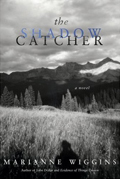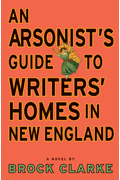
The Morning News Tournament of Books, sponsored by Powell’s Books, is an annual battle royale amongst the top novels in “literary fiction” published throughout the year. Read more about this year’s tournament »
» Buy the Books at Powells.com «
» Meet This Year’s Judges «
» Wager for Charity «
» Relive the Action: ’07, ’06, ’05 «
» Contact the Tournament Staff «
• ROUND ONE • MATCH EIGHT •
March 18, 2008
 |
The Shadow Catcherby MARIANNE WIGGINS |

|
| v. | ||
An Arsonist’s Guide to Writers’ Homes in New Englandby BROCK CLARKE |
judged by HELEN DeWITT
Fredric Jameson says of Adorno’s use of Freud:
Neurosis is simply this boring imprisonment of the self in itself, crippled by its terror of the new and unexpected, carrying its sameness with it wherever it goes, so that it has the protection of feeling, whatever it might stretch out its hand to touch, that it never meets anything but what it knows already.
He might have been writing of The Shadow Catcher and An Arsonist’s Guide to Writers’ Homes in New England.
An Arsonist’s Guide occupies a region, implausibly you may think, somewhere between Anne Tyler and Chuck Palahniuk. The Shadow Catcher occupies a region, again you may think implausibly, somewhere between W.G. Sebald and Joan Didion. Both start with promising ideas.
In An Arsonist’s Guide, a man finishes a 10-year prison sentence for accidentally setting fire to the Emily Dickinson House, thereby killing two people; marries, has children, conceals the bad past which comes back to haunt him, finds that someone is setting fire to writers’ homes in a way that makes him look like the arsonist. There are domestic eccentricities, there is Grand Guignol.
In The Shadow Catcher, the fictional alter-ego of Marianne Wiggins writes a book about Edward Curtis, photographer of vanishing tribes of the American West, who gets a call from a hospital: A dying man has taken on the identity of her father, who committed suicide decades ago. Solving the mystery alternates with chapters recounting the story of Clara, Curtis’s neglected wife. There are reproductions of photographs and documents, there are savvy comments on American culture and topography.
Both books are marred by a peculiarly American obsession with neurosis, wearying the reader with the sort of insight best shared with one’s therapist. An Arsonist’s Guide, however, falls furthest short of its own aims: It’s unintentionally unfunny. So The Shadow Catcher goes on to the next round.
• About the Judge •
• From the Booth •
| Frederic Jameson who? Adorno what? Is he one of those American Gladiators you’ve been going on about? | Kevin | John | One of the things the ToB reveals each year is that you and I are a couple of mouth-breathing idiots. |
» Read Kevin Guilfoile & John Warner’s commentary on the match «

» DOWNLOAD THE BRACKETS «
• Round One •
Tree of Smoke v. Ovenman
judged by Tobias Seamon
The Savage Detectives v. Let the Northern Lights Erase Your Name
judged by Elizabeth Kiem
Then We Came to the End v. Petropolis
judged by Anthony Doerr
You Don’t Love Me Yet v. New England White
judged by Jessica Francis Kane
Run v. Shining at the Bottom of the Sea
judged by Kate Schlegel
What the Dead Know v. The Brief Wondrous Life of Oscar Wao
judged by Elizabeth McCracken
On Chesil Beach v. Remainder
judged by Ze Frank
The Shadow Catcher v. An Arsonist’s Guide to Writers’ Homes in New England
judged by Helen DeWitt
• Round Two •
Tree of Smoke v. Let the Northern Lights Erase Your Name
judged by Mark Sarvas
Then We Came to the End v. You Don’t Love Me Yet
judged by Maud Newton
Shining at the Bottom of the Sea v. The Brief Wondrous Life of Oscar Wao
judged by Ted Genoways
Remainder v. The Shadow Catcher
judged by Mark Liberman
• SEMIFINALS •
Tree of Smoke v. Then We Came to the End
judged by Gary Shteyngart
The Brief Wondrous Life of Oscar Wao v. The Shadow Catcher
judged by Nick Hornby
• ZOMBIE ROUND •
Then We Came to the End v. Remainder
judged by Rosecrans Baldwin
The Brief Wondrous Life of Oscar Wao v. The Savage Detectives
judged by Andrew Womack
• FINAL ROUND •
Remainder v. The Brief Wondrous Life of Oscar Wao
All Judges + Jennifer Szalai

